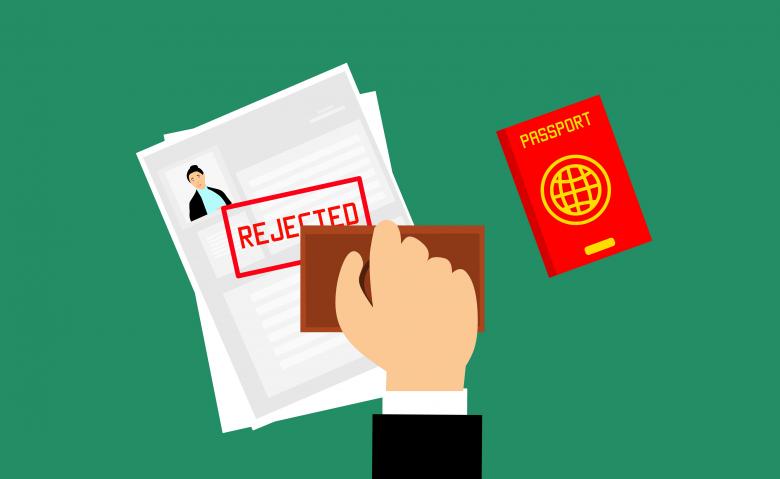
 Super Visa
Super Visa
If you have applied for a Canadian visa and received a rejection letter, you might wonder what to do next. A visa rejected Canada letter can be disappointing and frustrating, but it does not mean that you have no options to pursue your travel or immigration goals. Understanding the reasons behind Canada visa rejection can be pivotal in determining your next steps. Canada visa rejection reasons can vary, but some common factors include inadequate proof of funds rejection, incomplete documentation, and failing to meet the eligibility criteria.
Proof of funds rejection can be a significant hurdle in your visa application process. It is vital to provide clear and substantial evidence of your financial capability to support your stay in Canada. The Canada visa rejection rate, which has experienced fluctuations over the years, is another critical aspect to consider. By understanding the common Canada visa rejection reasons, specifically those related to proof of funds rejection, and staying informed about the Canada visa rejection rate, you can enhance your chances of a successful visa application and continue to pursue your travel or immigration goals.

There are many possible reasons why your Canadian visa application could be refused. Some of the visa rejections for Canada are:
You need to submit all the required documents for your visa type, such as passport, travel itinerary, proof of funds, invitation letter, etc. The documents should be clear, legible, and authentic. If you submit incomplete, inconsistent, or fraudulent documents, your application will be rejected. Ensuring that you submit all the required documents for your visa type is crucial. These may include your passport, travel itinerary, proof of funds, and an invitation letter, among others. It’s imperative that these documents are clear, legible, and authentic. Any inconsistencies, omissions, or fraudulent documents can result in a refusal letter Canada.
You need to prove that you have enough money to cover your expenses in Canada, such as transportation, accommodation, food, etc. You also need to show that you have a stable source of income or savings in your home country. To finance your travel and stay in Canada, you must demonstrate that you have sufficient funds to cover expenses like transportation, accommodation, and food. Additionally, you need to establish that you possess a stable source of income or savings in your home country. Inadequate evidence of your financial situation can raise doubts about your intent to return home, potentially leading to a super visa rejection.
You need to undergo a security screening and a medical examination as part of your visa application. If you have a criminal record, a serious medical condition, or pose a security risk to Canada, your application will be refused. As part of the visa application process, applicants are subjected to security screenings and medical examinations. If you have a criminal record, a severe medical condition, or pose a security risk to Canada, your application may face a visa rejection.
You need to undergo a medical examination as part of your visa application. Your application will be refused if you have a serious medical condition that could endanger public health or safety or impose excessive demand on Canada’s health care system. A mandatory medical examination is part of the visa application, and your application could be refused if you have a serious medical condition that might jeopardize public health, safety, or place an excessive burden on Canada’s healthcare system.
Demonstrating a genuine purpose for visiting Canada, be it for tourism, business, family visits, or other reasons, is crucial. Equally important is proving your strong ties to your home country, such as family connections, employment, property ownership, or other commitments that would compel your return after your visit. Failing to convince the visa officer of your intentions or raising suspicions of potential overstaying or illegal work in Canada can result in a refusal letter Canada.
To enhance your prospects of securing a favorable outcome for your Canadian visa application, it’s essential to heed the following advice to mitigate the risk of Canada visa rejection reasons:
A meticulous approach is vital. Begin by carefully reviewing the instructions and guidelines pertaining to your visa category. Ensure that you comprehend the prerequisites and procedures, and, most importantly, adhere to them meticulously. Submit all the necessary documents and fees in accordance with the stipulations. Leave no room for gaps or errors in your application form or the supporting documents.
The accuracy and consistency of the information you provide in your application form and the accompanying documents are paramount. Only include data that is germane and indispensable for your specific visa category. It is imperative that you abstain from presenting any false or misleading information and refrain from omitting critical details that may be relevant to your application.
If an interview with a visa officer is part of the application process, diligent preparation is key to success. Before the interview, revisit your application and the supporting documents to ensure that you are well-versed in your own case. Be ready to answer inquiries concerning the purpose of your visit, your travel plans, financial situation, and ties to your home country, among other aspects. An area that often leads to proof of funds rejection is the financial aspect of your application. Therefore, it’s crucial to pay meticulous attention to this aspect.
By implementing these strategies, you can significantly reduce the likelihood of encountering Canada visa rejection reasons. Taking a thorough and accurate approach, particularly in addressing financial aspects, will stand you in good stead and enhance your chances of securing a successful visa application.
Receiving a visa rejection letter from the Canadian government can be a disheartening experience. However, it’s essential not to lose hope, as there are still viable options to pursue your travel or immigration goals. The key is to understand the visa rejection reasons for Canada and take the appropriate steps based on the type of visa you applied for;

If you applied for a temporary resident visa, such as a visitor visa, student visa, or work permit, and received a refusal letter Canada within 90 days of applying online or 60 days of applying on paper at a Visa Application Centre (VAC), you may request restoration. This involves submitting an online web form with additional information or documents addressing the reason for refusal. There is a fee of $200 CAD associated with this option. It’s important to note that there’s no guarantee of approval, and the outcome of your application remains uncertain.
You need to pay a fee of $200 CAD for this option. There is no guarantee that your request will be accepted or that you will receive a positive decision on your application.
For those who applied for a permanent resident visa, such as family sponsorship or economic immigration, and received a visa rejection Canada, an alternative path is to appeal to the Immigration Adjudication Division (IAD) within 60 days of receiving the refusal letter. The IAD is an independent tribunal responsible for reviewing your case and making decisions regarding the refusal. A Notice of Appeal form must be submitted, along with a fee of $675 CAD.
In certain cases, you may need to attend a hearing to present your arguments and evidence to support your appeal. The IAD considers various factors, including humanitarian and compassionate grounds, as well as legal aspects during the appeal process.
The IAD is an independent tribunal that can review your case and decide whether to uphold or overturn the refusal decision. You need to submit a Notice of Appeal form and pay a fee of $675 CAD for this option. You may also need to attend a hearing where you can present your arguments and evidence to support your appeal. The IAD may consider humanitarian and compassionate grounds as well as legal issues in your appeal.
If you believe there was an error in law or fact in the refusal decision for any type of visa, you can appeal to the Federal Court of Canada within 15 days of receiving the refusal letter. The Federal Court is a judicial body that reviews your case and determines whether to dismiss or allow your appeal. You are required to submit an Application for Leave and Judicial Review form, along with a fee of $50 CAD. Similar to the IAD process, you may need to attend a hearing and present your arguments and evidence. However, the Federal Court of Canada focuses solely on legal issues and cannot consider humanitarian and compassionate grounds in your appeal.
While receiving a proof of funds rejection or a super visa rejection can be upsetting, it’s crucial to remember that you do have options to challenge the refusal decision and reapply for a Canadian visa. It’s of utmost importance to act swiftly and cautiously, as the appeal process can be complex and time-sensitive.
For assistance throughout this process, you may benefit from seeking professional guidance from an immigration lawyer or consultant. They can provide expert advice, guide you through the intricate procedures, and enhance your chances of success in your visa application.
If you want to learn more about Canadian Visas, please contact SayHomeCanada Immigration where our agents will be happy to help you!
Thank you for the response .
Let's Connect